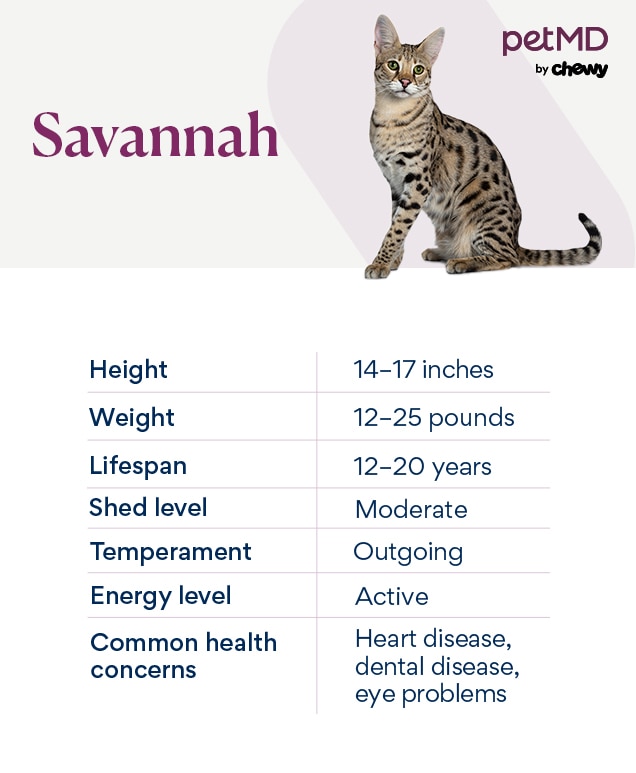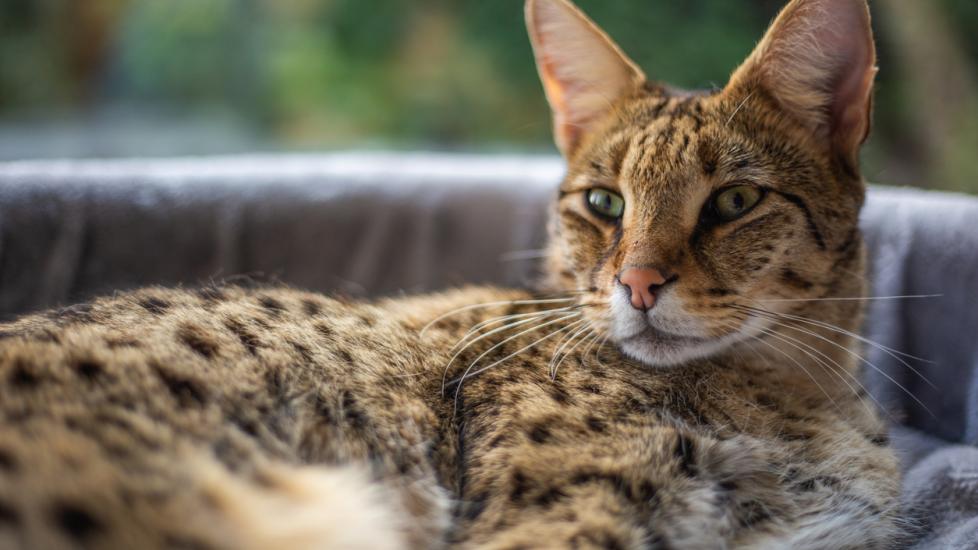Savannah
The Savannah house cat descends from a hybrid of the domestic cat and a wild African Serval. With their stunning jungle cat-like coats, these felines look just as exotic as they sound. While they emulate their wild relatives in more ways than one, Savannahs are also sweet-natured and family-oriented when properly socialized.
But before setting your heart on this perky-eared breed, check state and local regulations for any restrictions. Certain states, such as Nebraska, prohibit owning any Savannah cat, while states like New York and Colorado might allow you to keep a Savannah cat outside city limits—if your cat is of a higher generation.
Caring for a Savannah

The boldly spotted Savannah towers over other domestic breeds. According to the Savannah Cat Association, first-generation (F1) Savannah cats can average 16.3 inches in height, compared with domestic tabbies that might reach 9.8 inches. However, the world’s tallest cat—a Savannah named Fenrir—stands at 18.83 inches tall!
A kitten or cat called an F1 Savannah has one African Serval parent and one domestic cat parent, making them first-generation offspring. Second-generation offspring are called F2, and they have a Serval grandparent. As the generations increase, Savannah cats mellow in temperament and become a little smaller. Therefore, it’s recommended that pet parents consider F3 Savannah cats or higher for everyday companionship, especially if your household includes small children.
A Savannah cat’s spotted coat and uncommon lineage are far from the only traits that set them apart from other cats. Savannahs are said to delight in baths, are always up for a game of fetch, and make fantastic on-leash jogging partners.
Savannah Health Issues
Although Savannahs are generally healthy and have a lifespan of 12–20 years, they’re susceptible to some genetic health conditions. Purchasing your Savannah cat from a reputable breeder who ensures thorough testing of breeding parents can help you get a healthy kitten. For life’s other unpredictable moments, consider purchasing pet insurance for your Savannah kitten.
Pyruvate Kinase Deficiency (PKD)
PKD in cats is a genetic condition that causes a deficiency of the enzyme pyruvate kinase (PK). Without PK, red blood cells break down faster than usual. When a cat doesn’t have enough healthy red blood cells, they can become anemic or have other blood-related conditions. Fortunately, genetic testing can prevent PKD in kittens.
Progressive Retinal Atrophy (PRA)
Savannah cats are at risk of developing a genetic condition that leads to degeneration of the retina, called progressive retinal atrophy (PRA). There are two forms of this condition:
-
An early-onset inherited form, which occurs in kittens around 2–3 months old
-
A late-onset form, which is detected in cats between 2–5 years old
Symptoms typically begin with night blindness and then progress to total loss of vision.
Although there is no cure for this condition, cats that have lost their vision can still have a high-quality life with some extra care. Like PKD, responsible breeders can genetically test their breeding stock to prevent passing the PRA genes to Savannah kittens.
Hypertrophic Cardiomyopathy (HCM)
HCM is the most common form of heart disease in cats, but symptoms don’t typically appear in the early stages of the disease. As the disease progresses, cats often show symptoms as they develop congestive heart failure, like difficulty breathing and low energy. Preventative measures such as echocardiograms (heart ultrasounds) and routine annual exams can help detect the disease early.
Dental Disease
Feline dental disease is common, but pet parents can prevent gingivitis, bad breath, and periodontal disease by brushing your cat’s teeth every day. During your Savannah’s annual wellness exam, your veterinarian will examine their teeth and suggest a dental cleaning under anesthesia when necessary.
What To Feed a Savannah
Savannah cats can eat commercial dry and wet cat foods. A high-quality commercial diet that meets the nutritional recommendations set by the Association of American Feed Control Officials (AAFCO) will provide them with all the essential nutrients and vitamins for their life stage.
How To Feed a Savannah
Savannah cats are highly intelligent and crave activities that satisfy their predator-prey drive. Incorporating food puzzles, lick mats, and foraging can help satisfy their natural instincts. Because cats in the wild hunt for multiple meals a day, feeding two or more small meals daily may be most appealing to Savannah cats.
How Much Should You Feed a Savannah?
Despite being remarkably tall, Savannah cats are lean and typically weigh between 11–20 pounds, depending on their generation. To maintain their athletic figure, feed your Savannah cat the appropriate number of calories based on their age and lifestyle. Your veterinarian can help determine the right amount and may recommend dietary changes such as reduced calories or weight management food for overweight cats.
Nutritional Tips for Savannahs
A complete and balanced meal that meets AAFCO’s statement of nutritional adequacy will provide your Savannah cat with all the necessary essential nutrients, vitamins, fats, and proteins. In the case of health issues, your veterinarian may recommend additional nutrient supplements.
Behavior and Training Tips for Savannah Cats
Savannah Personality and Temperament
When socialized as kittens, Savannah cats can live happily in homes with other cats, dogs, and children, although it's recommended to consider F3 or a higher generation. Known to be more dog-like than cat-like, they enjoy following their humans from room to room and being involved in every activity. If they have something to say, they will loudly and proudly meow at you. Although Savannah cats can live in apartments, vertical space for exercise is crucial, so make sure to have cat trees, scratching posts, and cat shelves throughout your space.
Savannah Behavior
More likely to be found zooming through the house than curling up on a lap, Savannah cats are no couch potatoes. Like other cats lacking appropriate stimulation, Savannahs might release pent-up energy by scratching your couch or engaging in other destructive behaviors. To keep this from happening, provide Savannah cats plenty of opportunities to climb, scratch, and jump. (After all—they are rumored to have a jump spanning 8 feet.)
Savannah Training
The Savannah cat breed is highly intelligent and craves activities that satisfy their curious Serval nature. Thanks to their smarts and deep bonds with their humans, they make ideal candidates for training activities, like walking on a harness and leash. Some Savannah pet parents even take their felines for light jogs.
However, because of their agility and inclination to explore, Savannah cats should never be allowed outdoors off-leash.
Fun Activities for Savannah
-
Running on a cat wheel
-
Playing fetch
-
Exploring vertical spaces
-
Birdwatching
-
Foraging for treats
-
Food puzzles
-
Walking on harness and leash
-
Learning new tricks
-
Playing with other pets
Savannah Grooming Guide
Savannah cats resemble mini wild cats, with sleek coats that come in patterns including spotted black tabby, silver spotted tabby, black, and black smoke to more unusual colors including seal, seal lynx, cinnamon, chocolate, and blue. They have ears that look much too large for their small heads, just like their Serval relatives.
To keep up their charming appearance, Savannah cats require little grooming beyond regular cat care.
Skin Care
Savannah cats don’t require special skin care, but if you notice overgrooming, itching, or skin irritation, schedule a check-up with the veterinarian.
Savannah cats are known to relish bath time—especially a bath with cat-friendly bubbles. When choosing a shampoo, look for ones made especially for cats and without harsh scents or skin-drying ingredients.
Coat Care
Savannahs have short, sleek coats that are easy to maintain. While they don’t shed excessively, they’ll enjoy being brushed weekly.
Eye Care
A Savannah cat’s eyes don’t require special care. They do have a slightly more prominent brow compared to other cat breeds, with their eyes angled downward toward the nose and distinctive dark lines that run from the eyes to the nose.
If you notice that your Savannah might not be able to see well (for instance, if they’re bumping into things or vocalizing more), take your cat to the vet to have their eyes assessed for PRA.
Ear Care
To prevent ear infections in your Savannah’s ears, keep them clean and dry, especially after a bath or swim. Signs of ear infections in cats include a foul smell, discharge, and irritation.
Considerations for Pet Parents
Before welcoming a Savannah cat into your home, be sure you can dedicate the time to keeping them active; Savannah cats are easily bored without daily stimulation. These Serval hybrids need space to climb, jump, and scratch. Indoor toys like cat wheels, perches, and feeder puzzles will also enrich your cat’s life.
While Savannah cats can live with families including small children, dogs, and other cats, they’ll require proper socialization. It’s recommended that most pet parents and those with small children consider F3 Savannahs and higher—these cats tend to be smaller and a bit calmer than F2 or F1 Savannah cats. With proper care, Savannahs can bond deeply with their pet parents—and provide endless entertainment.
Savannah Cat FAQs
Is a Savannah cat a good pet?
Savannah cats are excellent pets for those seeking an active feline with an outgoing personality. However, it's important to note that their personalities and temperaments can vary by generation. Those looking for a smaller and more docile Savannah cat should consider higher generations, typically F3 or higher.
Can a Savannah cat be a house cat?
Savannah cats, despite being a hybrid of a wild African Serval and a domestic cat, are considered domestic house cats. Due to their agility and desire to roam, Savannah cats should be kept indoors unless they’re on a leash and harness or inside a secure catio. They’re suitable for apartment life with appropriate play, exercise, and environmental enrichment.
Are Savannah cats cuddly?
Savannah cats enjoy the company of their humans. So if you’re relaxing on the couch or heading to bed, chances are your Savannah will be right there with you. However, Savannah cats require a fair amount of exercise, with the lower generations (F1 and F2) being the most active.
How much is a Savannah cat?
According to the Savannah Cat Association, Savannah cats can cost as much as $15,000. F2 and lower generations of Savannahs range from $9,000–$1,500.
Featured Image: iStock/Gennadiy Naumov
